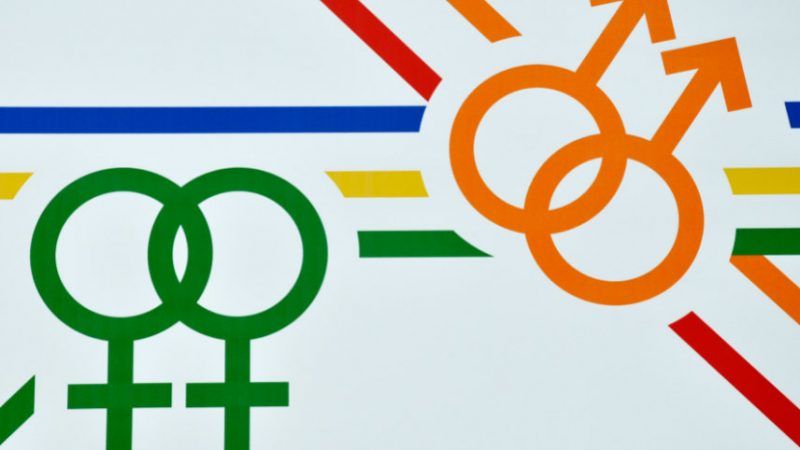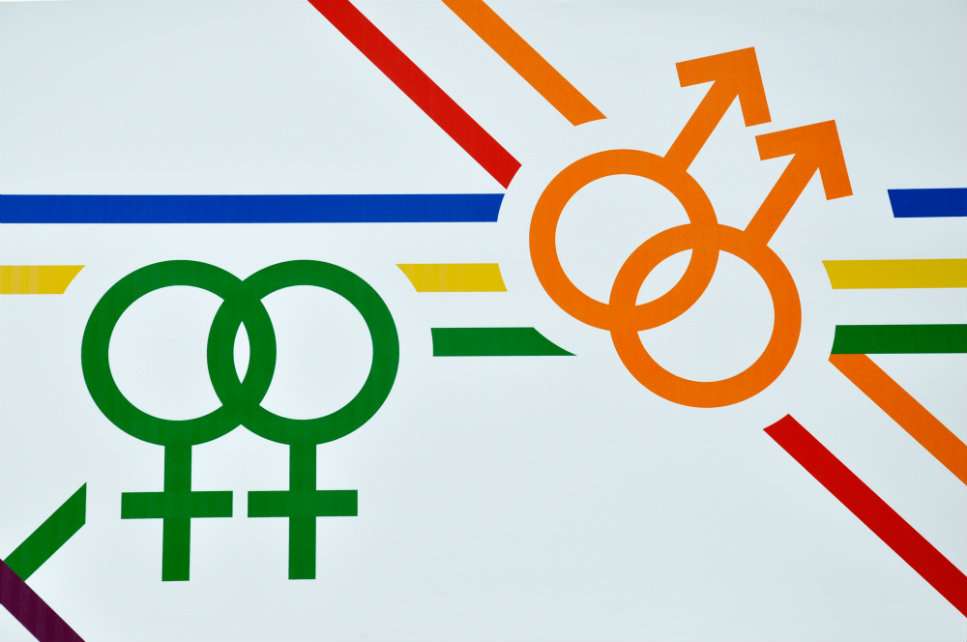Men and Women Are Less Alike in More Feminist Countries
Places that score high for gender equality also show more sex differences on personality tests.


Men and women show more pronounced differences on personality tests in countries considered to have higher levels of "gender equality." That's the main takeaway from two recent research studies getting good media buzz.
More fuel for the culture wars? It shouldn't be. There are a number of ways to interpret the data, and the authors of both studies caution against taking their results as congruent with standard progressive or traditionalist narratives. The quirky nature of the findings is what makes this some of the interesting recent scholarship in sex and gender studies, presenting wiggle room for speculation and myriad questions for future research.
In the International Journal of Psychology, Swedish scientists Erik Gioola and Petri Kajonius look at personality trait differences between men and women in 22 countries. Their results include 130,602 participants between ages 19 and 69—57 percent of them women—who opted into an online personality survey (in English) after finding it via word of mouth or online search. Specifically, they looked at five broad personality traits: agreeableness, conscientiousness, extroversion, neuroticism, and openness.
"Because personality is inherently multidimensional," write Gioola and Kajonius, they rely on complex multivariate model measures to come up with some composite personality data, rather than looking trait by trait or using an average of the five as in prior studies. To measure a country's cultural equality between men and women, they relied on the World Economic Forum's Global Gender Gap Index rankings.
"Moderation analyses showed no significant effects of sex on the relationship between any [one] of the big five personality traits and gender equality," they write. Across countries, higher gender equality scores were correlated with:
- higher scores for both men and women on agreeableness and openness;
- lower scores for both men and women on conscientiousness
- slightly lower scores on neuroticism among men and slightly higher neuroticism scores for women;
- and lower extroversion scores for men but no change among women.
But comparing the composite personality data, they found that "sex differences in personality are larger in more gender equal countries." Specifically:
- Men and women were the most different in the Netherlands, Norway, Sweden, Canada, the U.K., Germany, the U.S., Australia, France, Ireland, and Finland, scoring between 1.02 (Netherlands) and 0.8 on the gender gap scale in these countries.
- Men and women showed the least personality difference in China (0.39), Malaysia, South Korea, Japan, and India.
- In the middle (0.6-0.8) were the Philippines (on the low end) South Africa, Mexico, Singapore, Romania, and New Zealand.
So how do we interpret these results? The authors consider several ways. One theory is that when people are less confined by strict social norms and roles, their innate personalities and preferences can shine through—and these preferences aren't progressive. "A possible explanation," they write, "is that as gender equality increases both men and women gravitate toward their traditional gender roles."
The evolutionary perspective says that an environment with fewer cultural restraints allows men and women to reclaim their true—and quite different—selves. But proponents of this perspective need to grapple with another paradox: what is supposedly stopping those in less gender-equal countries from embracing traditionalism and sex differences? And how does all this square with the evolutionary theorists who say higher neuroticism, anxiety, and depression scores among women in modern liberal democracies is caused by women having to suppress their true traits and desires?
Ultimately, "a combination of social role theory"—that gendered traits are a product of culture and socialization—"and evolutionary perspectives may be needed to account for this curious result," the study authors write.
Perhaps countries with smaller social and economic gaps between men and women wind up valuing other sorts of differences between them more. Women, men, or both may have found that as more women entered schools, workplaces, politics, leadership roles, and more egalitarian relationships, embracing and emphasizing complementary or opposite traits—consciously or not—served as a competitive advantage or necessary survival skill.
Or maybe women's new cultural roles shifted expectations and stresses in ways that triggered aggregate personality shifts in both sexes as a byproduct. A 2008 study on male/female personality differences in 55 countries found that "overall, higher levels of human development—including long and healthy life, equal access to knowledge and education, and economic wealth—were the main nation-level predictors of larger sex differences in personality." The "primary cause" of this differentiation was "changes in men's personality traits."
And let's not overlook reactionary motifs, either. As places grow more egalitarian in economic possibilities, legal rights, and social expectations—and women's status both in their homes and in the larger world grows—not everyone embraces it equally. Most modern states are made up of neither staunch traditionalists nor social radicals, yet folks with only minor ideological attachments to strictly divided gender norms may still embrace more symbolic aspects of them. Consciously or not, people often cling to outward markers of differences more staunchly when other lines start to blur (something we see far outside the realm of sex and gender).
Those who abhor or feel left out by the changes—which can be a large percentage of the population—may cling more fiercely to old roles and ways. And those who seek to subvert the old rules may consciously adopt conventional aspects of femininity or masculinity in order to get by, especially in more culturally homogeneous or strict societies.
Which raises the possibility that country-level differences in trait distribution may not be linked to gender equality per se so much as the phenomenon's corollaries: economic liberalism and prosperity, increasing levels of cultural and political openness, individual rights and potential.
"Cries of 'correlation isn't causation' tend to accompany any studies like these, but they're oddly absent from conversations about the paradox," notes Cathleen O'Grady at Ars Technica. "That might be because it seems unnecessary—when you're talking about gender equality and gender differences, there's such an obvious relationship that it seems like, for once, we could ignore the niceties about correlation and just assume that one causes the other."
But there are limitations to the World Economic Forum rankings. "The index looks at progress on measures like economic participation and political empowerment, but it isn't able to capture wobblier human factors like cultural beliefs and stereotyping," writes O'Grady. "This is illustrated by looking at Rwanda, which has made enormous strides in political representation of women while making little progress in changes to traditional gender roles; it currently ranks sixth on the index". And while "data on whether the differences increase as countries climb the ranks of gender equality" could help clear up some clutter here, "there could be something else underlying the pattern: cultural history."
One interesting thing to study would be the degree to which gender gaps in personality traits map to a place's slant toward individualism or collectivism. In the Gioola and Kajonius study, countries with strong individualist traditions (the U.S., France, Australia) tended to show higher variance, while those that have put more emphasis on the collective good (China, South Korea, Japan) showed less.
Another new study, this one published in Science, looked at data on 80,000 people from 76 countries with an emphasis on traits such as altruism, trust, patience, and risk taking. Authors Armin Falk, an economics professor at the University of Bonn, and Johannes Hermle, a doctoral student at the University of California, Berkeley, found that both higher levels of gender equality and wealth corresponded to bigger differences between men and women on these traits.
In a previous paper from Kajonius using the same data, researchers found that "within-country sex differences for the five personality traits showed similar patterns across countries," and that "the relationship between a country and an individual's personality traits, however interesting, are small"—overall, they found that an "average 1.8% of the variance in personality traits could be accounted for by country belonging. Put differently, within-country differences in personality traits are of more interest than between-country differences."



Show Comments (74)